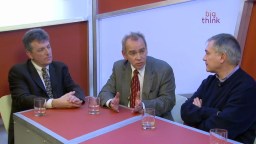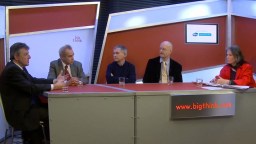November, 2010
November, 2010
Big Think hosted a panel discussion highlighting cutting-edge Alzheimer's disease research as part of our Breakthroughs series, made possible by Pfizer.
This conversation features back-and-forth exchanges between top luminaries in the field, including Dr. Samuel Gandy, Mount Sinai Professor of Alzheimer's Disease Research; Dr. Leonard Guarente, Director of Glenn Lab for Science of Aging at MIT; Dr. Juan Troncoso, Director of the Brain Resource Center at Johns Hopkins University School of Medicine; and Dr. Ottavio Arancio, Professor of Pathology & Cell Biology at the Columbia University Medical Center. The panel was moderated by Meryl Comer, President of the Geoffrey Beene Foundation Alzheimer’s Initiative.
A conversation between top experts highlighting cutting-edge Alzheimer’s disease research.
▸
56 min
—
with
Genetic testing is advancing rapidly, and we can now find out our risk factor for developing Alzheimer’s. But without a cure or treatment available, what’s the point?
▸
3 min
—
with
Studies have shown that you can boost brainpower and brain resilience with vitamins and exercise, and by not smoking. But lifestyle choices alone can’t prevent Alzheimer’s?
▸
7 min
—
with
Alzheimer’s starts in one area and spreads all over the brain, like an infection. Does this mean that it’s possible to develop a vaccine?
▸
6 min
—
with
Genes such as ApoE4 may signal a risk factor for Alzheimer’s. But how do we separate risk factor from an unalterable sentence for the disease?
▸
8 min
—
with
Amyloid plaques and neurofibrillary tangles inside the brain are the best explanation we have for how Alzheimer’s develops.
▸
5 min
—
with
Mental decline, on some level, is inseparable from aging. With more people living longer, does this mean everyone will eventually get Alzheimer’s?
▸
6 min
—
with
One of the most robust environmental risk factors identified for Alzheimer’s disease is traumatic brain injury. This is having repercussions for those returning from fighting in Iraq and Afghanistan.
▸
4 min
—
with
Amyloid buildup in the brain is a key trigger for Alzheimer’s, but some people with this plaque live their entire lives without developing the disease.
▸
7 min
—
with
Are women and African-Americans at a higher risk for Alzheimer’s—as some data suggests—or are there other factors in play?
▸
3 min
—
with
For much of the past 100 years, little was known about Alzheimer’s disease and dementia. But recent research is revealing the neurotransmitter and genetic defects behind the disease.
▸
5 min
—
with










